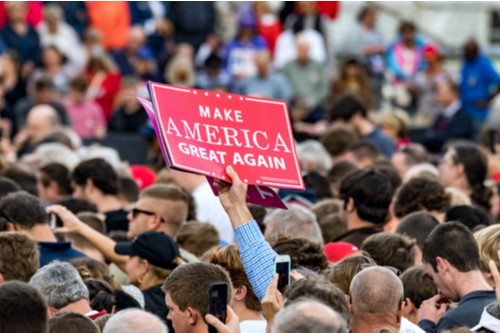- Conventional wisdom is that the U.S. empire is on the skids, but is that really the case? Americans are always focused on some foreign adversary – real or imagined.
- Today, Nicholas Vardy examines America’s unique history of self-deprecation and what’s really happening in the U.S.
Conventional wisdom is that the U.S. empire is on the skids.
America’s best days are behind it.
Even President Donald Trump’s election slogan – “Make America Great Again” – embodies this nostalgia for better days gone by.
German journalist Josef Joffe calls this sentiment “declinism.” And it’s nothing new.
Whether it was the Soviet’s launch of the Sputnik satellite in the 1950s… the morass of the Vietnam War in the 1970s… Japan as the “rising sun” in the 1980s… or China’s rise as an economic juggernaut in the 2000s…
Declinism is a uniquely powerful theme in American culture. And it is embraced by both sides of the political spectrum.
China: “This Time Is Not So Different”
It seems that each new decade boasts a new rival to American power.
In 1960, Soviet Premier Nikita Khrushchev threatened to “bury” the United States. And he had the chutzpah to make that threat at the United Nations headquarters in the middle of Manhattan.
In the 1980s, novelist Michael Crichton, author of Rising Sun, argued that the U.S. had devolved into a second-rate economic power compared with Japan.
China has taken on the role of a rival global superpower today.
Alas, predictions of America’s decline fail to live up to the hype.
Nobel Prize-winning economist Paul Samuelson predicted the Soviet Union would overtake the U.S. economy by 1984. Instead, the Soviet Union was wiped off the map in 1991.
In the late 1980s, Japan entered a 30-year period of stagnation from which it has yet to emerge.
China’s economic growth rate peaked at about 10% per year and has fallen to (still exaggerated) 6.5%. Nobel Prize-winning economist Robert Fogel’s prediction that by 2040 the Chinese economy will reach $123 trillion – roughly 10 times its current size – sounds increasingly absurd.
America: A Remarkably Self-Critical Culture
The United States has an unusually self-critical culture. If there hadn’t been a Soviet Union, Japan or China on the horizon, Americans would have invented one.
The U.S. is unique in that it sees every crisis as its own fault.
Other cultures moan and groan. Europeans, they blame their woes on the Greeks (too lazy), the Germans (too industrious) or a long-forgotten historical event (too unfair).
Even with China’s blatantly one-sided trade policies, currency manipulation and theft of U.S. intellectual property, Trump doesn’t blame the Chinese. He blames his predecessors for making “a bad deal.”
A Unique Combination of Brains and Brawn
As any visitor from other parts of the developed world will tell you…
America’s airports, roads and infrastructure border on decrepit. Its healthcare system is both expensive and inefficient. And its politics are more divided now than in recent memory.
Yet America’s unique strength remains that it attracts the world’s best.
Let’s start with brains.
Americans have dominated the Nobel Prize since the end of World War II. In this, America’s ability to attract the best from all over the world has been vital.
Immigrants have won 38% of the Nobel Prizes awarded to Americans in chemistry, medicine and physics since 2000. This year alone, French-, Indian-, British- and Canadian-born scholars at MIT, SUNY Binghamton and Princeton won Nobel Prizes.
Hungary has also produced about a dozen Nobel Prize winners. All but one did their work outside the country. As Bret Stephens advised in The Wall Street Journal, “If you are brilliant, ambitious and Hungarian, better get out while you can.”
Enough about brains. How about brawn?
U.S. and foreign athletes associated with just three California universities – Stanford (27), Berkeley (22) and the University of Southern California (21) – won 70 medals at 2016’s Rio Olympics.
That total matched the medal count of China – a country with a population 35 times that of California.
Not all the Olympic medal winners were American. But like the world’s leading scientists, foreign athletes came to America to reach their highest potential.
Why U.S. Decline Is a Myth
Crack open a history book… or watch a historical documentary… and you’ll learn that America’s challenges are no greater than they were in generations past.
The United States is a noisy, contentious democracy. Ironically, it’s precisely the churning and change that give America its unique resilience.
Will the U.S empire crumble one day? Perhaps it will. But it won’t happen tomorrow… or any time in the foreseeable future.
Yes, America has its significant challenges and flaws.
But it also has the ingenuity, political structure, and physical and human capital to overcome almost any crisis.
As the half-American Winston Churchill observed, “You can always count on Americans to do the right thing – after they’ve tried everything else.”
Good investing,
Nicholas
P.S. I’m rereading Josef Joffe’s The Myth of America’s Decline: Politics, Economics, and a Half Century of False Prophecies, which outlines a foreigner’s extremely rare sympathetic take on America and its prospects.
Interested in hearing more from Nicholas? Follow @NickVardy on Twitter.
